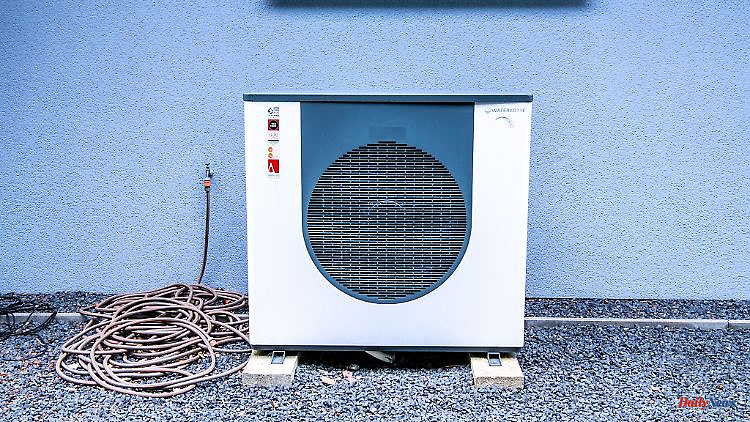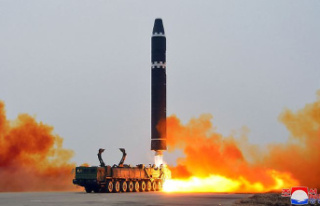Heating costs have risen quite a bit in the last few months. In search of a cheaper and more environmentally friendly alternative to gas or oil, more and more people are looking into the subject of heat pumps. Read here what you should definitely pay attention to.
Saving costs and living energy self-sufficiently, this promise has generated increased interest in heat pumps. Which is not surprising, because the idea of being independent of energy companies and rogue states is attractive. With the gas price brake from March 2023, however, the gas price will drop to 12 cents per kilowatt hour.
So what's the hype about heat pumps? And given these perks, is it still worth making the switch now? Energy expert Dr. Tim Rosengart from the comparison and information portal Selfmade Energy.
How does a heat pump work?
Heat pumps are generally regarded as a climate-friendly alternative to conventional systems such as gas or oil heating. Basically, they work like an inverted refrigerator. While the coolant in a refrigerator removes heat, a heat pump brings it into the house. The heat required for this comes from the ground, groundwater or the outside air. If the heat requirement exceeds the output of the pump, additional electricity is required for an additional heating element. This electricity can, for example, come directly and cheaply from your own photovoltaic system or a connected battery storage system. Heat pumps are therefore particularly worthwhile in this combination. Of course, it can also be operated using more expensive electricity from the grid. But the less often you exceed the heat requirement, the better - and cheaper.
How much does a heat pump cost?
Including the installation, an air heat pump costs between 20,000 and 25,000 euros. The groundwater heat pump costs about the same, with additional development costs of 5,000 to 10,000 euros. With the geothermal heat pump, the price including installation is between 15,000 and 20,000, a distinction is made between pumps with geothermal collectors and probes. A deep bore of about 100 meters is necessary for probes - there are 50 to 75 euros per meter of bore depth. If the subsoil is very rocky, it can even cost up to 100 euros. Ground collectors weigh in at around 25 euros per square meter.
After commissioning, however, the maintenance costs are lower than with other heaters and there is no need for a visit from the chimney sweep. Only the pressure, tightness, temperature and mechanics have to be checked every two years, at a cost of around 100 euros a year.
How do I recognize a good heat pump?
What the horsepower is for a car, the annual working time is for a heat pump. It can be used to compare the efficiency of a heat pump: an AC of 3 means that 3 kWh of heat are generated from 1 kWh of electricity - from an AC of around 3, a heat pump is currently considered efficient. However, the information provided by the manufacturer reflects ideal conditions. In practice, air-source heat pumps achieve an average of 2.8, geothermal heat pumps of 3.5 and groundwater heat pumps of 3.8.
In addition, when purchasing the devices, care should be taken to ensure that they bear the seal of quality of the European Heat Pump Association (EHPA). It stands for a two-year full guarantee, 24-hour service and spare parts availability for the next ten years.
What support measures are there?
The federal subsidy for efficient buildings (BEG) applies to heat pumps, and users are entitled to 25 percent of the basic subsidy. If you want to replace an old gas or oil heating system, you can count on a further 10 percent. There is also a 5 percent bonus for either natural refrigerants or the choice of a ground or water pump. The maximum subsidy amount of the BEG is therefore 40 percent. By the way: The federal funding for climate-friendly new buildings will apply to the new building from March.
It is important that the applications are submitted to the Federal Office of Economics and Export Control before the start of a measure. In addition, a planned heat pump must have an expected JAZ of 2.7 or higher, from 2024 an JAZ of 3.
What pitfalls do I have to watch out for?
Some heat pumps have a so-called buffer storage tank to bridge brief interruptions during off-times due to the power grid, which heat pumps are subject to - albeit with additional energy losses. Heat pumps with so-called inverter technology are better. It is also advisable to pay attention to the GWP value of the built-in refrigerant. The GWP value/CO2 equivalent indicates the greenhouse potential of a substance and thus its contribution to warming the air layer near the ground. The lower the value, the more climate-friendly the heat pump is. For example, the refrigerant R32 has a GWP of 675, R410a has a value of over 2000.
Air source heat pumps also make noise. Therefore, attention should be paid to the decibel values and the installation site. But there are also devices with a quiet night mode or a lower average volume. Ground and water heat pumps, on the other hand, are quiet, but they are subject to approval.
For whom is a heat pump worthwhile?
In principle, the less heat is required, the better. Good thermal insulation and surface heating, for example over the floor, which distributes the heat better or keeps it in the house, are advantageous. The water temperature can then be correspondingly lower. New buildings are generally more suitable, but subsequent energetic renovation can also increase the efficiency of the heat pump. In any case, it is necessary to deal with the heating output and energy balance of your own home. The consumer advice centers, among others, can help here.
Is the purchase worthwhile despite the gas price brake?
If you calculate with the 12-cent tariff of the gas price brake, modern gas heating is actually cheaper than an air heat pump at first glance, but more expensive than a geothermal heat pump. But: The measure expires on April 30, 2024, which will probably drive gas prices up again. Projected over a period of 20 years (calculation by energie-experten.org), heat pumps are more worthwhile in the long term. With a heating electricity tariff of 38ct/kWh, the air heat pump is the cheapest, with 50ct/kWh it is the geothermal heat pump - provided the electricity price does not rise too much. On the other hand, if you own a solar system, you're in the right place. This is because the electricity can be generated here and does not have to be bought from a supplier at great expense.












